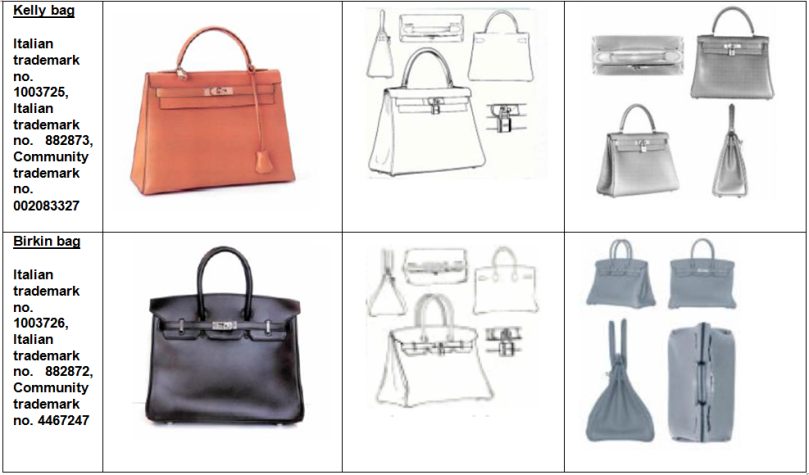The Court of Florence recently expressed an interesting view on the interpretation of absolute grounds of registration invalidity provided for signs constituted by the shape of a product, and, in particular, substantial value.
The case concerned the shape of the world wide famous Hermes’ “KELLY” and “BIRKIN” bags, the shape of which was registered as 3D trademark in Italy and before the EUIPO.

Hermes alleged the infringement of its famous trademarks by an Italian company offering for sale bags highly similar to the ones protected with Hermes shape trademarks. The alleged infringer resisted claiming, as usual in these cases, that the above trademarks were invalid since, besides other things, they consist of a shape giving substantial value to the bag.
The Court of Florence dismissed such claim, excluding the existence of a substantial value with an unusual (and deeply interesting) interpretation of this prevention.
Firstly, the decision (available here) defines substantial value as a real and concrete aesthetic plus-value – relevant per se to the product, being instead irrelevant the existence of any particular decoration or added part – that cannot be separated from the product itself and is capable of prevailing on the product’s shape features that are necessary to its function.
Then, the Court expressly excluded that the mere ornamental attitude of the product’s appearance could be of relevance in the evaluation on the existence of a substantial value. Differently from the main case law on this ground of refusal (see decision of 15 February 2012 of the Court of Venice on Crocs shoes or decision of 16 June 2015 of the Court of Milan on Flou’s Nathalie bed), the decision essentially denies that substantial value consists in the capability of the shape to influence the consumer’s choice of purchase, so to be itself the main reason why the product is in fact chosen and bought. In the Court’s view, this capability of the object’s shape to catch the consumers’ attention is connected only with trademark reputation.
Only when the aesthetic appearance of the product’s ornamental shape is so relevant to give a particular aesthetic value inseparable from the product itself trademark registration is prevented. Having this interpretation of substantial value in mind, the Court affirmed that “KELLY” and “BIRKIN” bags where valid trademarks as their shape trademark may be separated from the product itself and does not merely consist in the standard appearance of bags.
This decision interestingly tries to plot a demarcation line between substantial value and trademark reputation/distinctiveness that are often overlapped in the context of the discussions on substantial value. The distinction proposed by the Court of Florence could indeed be of help in drafting a clear and new definition of substantial value, whose interpretation is still not crystal clear when applied to real cases. As a matter of fact, and as actually noticed by the Vespa case (see here), the current interpretation of this condition often leads the trademark owner to deny the attractiveness and distinctiveness of the shape of a product when substantial value is under discussion on the basis that an actual recognition of the shape of the product on the market may lead to the assertion of the existence of a substantial value.
The interpretation of the Court of Florence would not fall into this trap and appears to be more logical in the overall context of the trademark protection, as it denies any relevance of the trademark distinctive character in the context of absolute grounds of registration invalidity provided for signs constituted by the shape of the product. This interpretation, although interesting, is however new and currently isolated. While certainly providing food for thought, it downplays the meaning, and legal sense , of the requisite of substantial value as a reason to attract consumers. If only reputation is attractive, what is the meaning, and sense, to verify the occurrence of a substantial value? ‘Substantial’ to what effect?!
Maria Luigia Franceschelli
Court of Florence, case No. 5850/2010, 31 January 2017, Hermes International Scpa, Hermes Sellier SA, Hermes Italie SpA vs. Papini Paolo & C. Snc and Corsini Giorgio di Gianna e Paola Corsini Snc.

